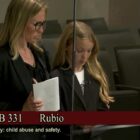CORRECTION 3/2/23: A spokeswoman for State Sen. Rubio’s office said Rubio was planning to introduce a bill to allow California’s trial courts to digitally record civil and family law cases. An earlier version of this story incorrectly stated that Rubio had introduced the legislation. Rubio’s staff clarified that the bill was still being worked on.
State Sen. Susan Rubio is planning to introduce a bill that would allow California’s 58 trial courts to digitally record civil and family law cases, a controversial effort to address statewide courtroom staffing shortages that deprive low-income litigants of official court transcripts.
The move comes two weeks after Los Angeles County Superior Court announced a slew of unprecedented financial incentives to recruit and retain court reporters.
Court reporters provide verbatim documentation of proceedings that are critical to filing appeals, reviewing judges’ behavior and reading back proceedings to jurors.

Courtesy of State Sen. Susan Rubio.
California has been experiencing an acute shortage of court reporters. On Feb. 17, State Sen. Susan Rubio introduced a bill that would allow the state’s 58 trial courts to digitally record civil and family law cases.If approved, the legislation would sidestep the issue of recruiting and training more staff, which has proven a financial and logistical challenge statewide.
“This is very positive,” said Jennafer Wagner, director of programs at the Family Violence Appellate Project, which is sponsoring the bill. The nonprofit provides pro bono assistance to domestic violence survivors and their children appealing trial court decisions in California and Washington.
California law requires courts to provide court reporters in criminal felony and juvenile matters, but not in civil courts, which include family law, probate cases or matters assigned to the writs and receiver departments.
In early February, the Los Angeles County Superior Court announced that it would use nearly $10 million — its portion of $30 million the state had given to all 58 of its courts for fiscal year 2023 to provide financial incentives to “hire, retain and reward” court reporters. The court has 100 vacancies. San Francisco’s share of the state funding is $703,092.
For more than a decade, California has been experiencing an acute shortage of court reporters that has forced nearly all its courts, including San Francisco Superior Court and Los Angeles County Superior Court, the largest trial court in the nation, to hustle to fill vacant slots.
The shortage is severe and longstanding; trial courts have been eliminating court reporters in family and civil law cases as a cost-saving measure since as far back as 2012. In November, Los Angeles County Superior Court announced that it would not provide court reporters for family court hearings, despite a 2018 state Supreme Court ruling, Jameson v. Desta, that requires they be provided to poor litigants who have fee waivers. Typically, litigants must pay for court transcripts for civil hearings and trials. If an official court reporter is not available, litigants who can afford to do so may hire their own certified shorthand reporter.
The state Legislature tried unsuccessfully twice in the last decade to introduce electronic recording in courts, which faced opposition from the union that represents court reporters.
“We’re going to push back at any attempts” to switch to electronic recording, David Green, president of SEIU 721, which represents some 2,000 court reporters in Southern California, said in an interview last month when asked if the union continued to oppose California courts going digital. The move, he said, “puts people at risk,” because transcriptions generated from digital recordings are not as good as those produced by a court reporter. Green did not respond to calls seeking comment on Rubio’s bill.
Rubio’s office said the Los Angeles-area Democrat has been trying to work with the union, and that transitioning to electronic recording would not take jobs away from court reporters, but would make their jobs “better.”








